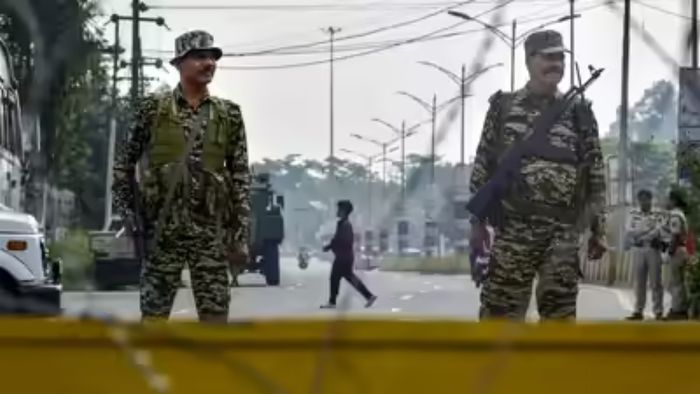Intel points to ‘contract killing’ behind Sep 19 Manipur ambush aimed at undermining President’s Rule
Security forces have launched a major crackdown on the banned People’s Liberation Army (PLA), one of Manipur’s most prominent valley-based insurgent groups, arresting 15 cadres, including two key suspects allegedly involved in last month’s deadly ambush on an Assam Rifles convoy that killed two soldiers in Nambol.

- Oct 06, 2025,
- Updated Oct 06, 2025, 8:20 AM IST
Security forces have launched a major crackdown on the banned People’s Liberation Army (PLA), one of Manipur’s most prominent valley-based insurgent groups, arresting 15 cadres including two key suspects allegedly involved in last month’s deadly ambush on an Assam Rifles convoy that killed two soldiers in Nambol.
Officials identified the two prime accused as Thoungram Sadananda Singh alias Purakpa (18) and Khomdram Ojit Singh alias Keilal (47). Their arrests were made within 72 hours of the ambush, which took place in Nambol Sabal Leikai on September 19.
The attack claimed the lives of Naib Subedar Shyam Gurung and Rifleman Ranjit Singh Kashyap, whose vehicle was ambushed along the Patsoi–Nambol route, an area where the Armed Forces Special Powers Act (AFSPA) is not in effect and road security is handled by the CRPF.
Security officials said a van suspected to have been used in the attack was later recovered from Mutum Yangbi, about 12 km from the ambush site. Six of the weapons seized during the ongoing operations are believed to have been looted from a police armoury during the early phase of ethnic clashes in 2023, indicating that arms originally used in communal conflict are now resurfacing in insurgent attacks.
Also Read: Assam Rifles foil bomb plot, recover two IEDs in Manipur's Jiribam
In a significant revelation, officials said that Thoungram Sadananda was earlier associated with the United National Liberation Front (UNLF) but switched allegiance to the PLA after the UNLF leadership agreed to a ceasefire and joined the Suspension of Operations (SoO) framework with the Union Home Ministry.
The PLA, notably, has not claimed responsibility for the Nambol ambush — a rare deviation from its decades-long practice of owning its operations. Intelligence inputs suggest that the central leadership of the outfit neither sanctioned nor was aware of the attack, leading investigators to explore the possibility of a politically motivated “contract operation” aimed at destabilising Manipur under President’s rule or discrediting efforts to restore normalcy.
Following the ambush, Governor Ajay Bhalla chaired an emergency high-level meeting, calling for coordinated action among all security agencies to tighten surveillance and secure soft targets, including major highways and transport routes.
Officials are also probing whether the PLA has received political backing, particularly as scrutiny intensifies in the wake of the UNLF’s truce announcement. Authorities suspect certain vested interests are trying to project President’s rule as ineffective and press for the reinstatement of the suspended state assembly.
Observers have expressed concern about the reactivation of valley-based insurgent outfits such as the PLA, UNLF, Kanglei Yawol Kanba Lup (KYKL), and People’s Revolutionary Party of Kangleipak (PREPAK), warning that many cadres may exploit the ceasefire environment to regroup and redirect violence.
The PLA, with an estimated 500 active members, seeks to establish an independent Meitei homeland in the Imphal Valley. Other valley-based groups, including PREPAK (both factions), KYKL-OKEN, UNLF-K, and KCP-NOYON, have a combined strength of about 550 cadres, while the Kangleipak Communist Party (KCP) and National Revolutionary Front of Manipur (NRFM) are believed to field around 900 and 200 fighters respectively.
Manipur has remained on edge since ethnic clashes erupted between the Meitei and Kuki-Zo communities in May 2023, over disputes related to land ownership and political representation. The violence has so far claimed more than 260 lives and displaced over 50,000 people, leaving deep scars on the state’s fragile socio-political landscape.